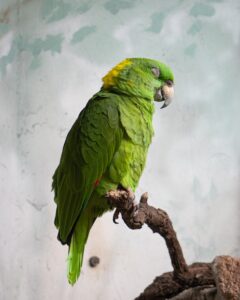
One of the great mysteries of humans is why we dream. Dreaming – as far as we can determine – is a necessary function that suggests the ability to process the mental and emotional receptions of the day. Dreaming itself is a process that occurs during REM sleep segments. REM (Rapid Eye Movement) is a process that usually takes up approximately 25% of your sleep time and represents a period of brain activity that mimics the times when we are awake. The non-REM period of sleep patterns is believed to help with brain waste removal.
The REM period of sleep is a complex process that requires more than just a few words to list its benefits. With that, we jump into the questions: Do birds have REM-states? Do birds experience dreams? How would we know?
A Fascinating Look at How Birds Sleep
The Max Planck Institute has a group named the Avian Sleep Group. They actively study the functions of sleep, its benefits, and other things as they pertain to our loved birds. As they study the reality of bird sleep, they uncover interesting realities that prove that birds of the world produce similar brain functions as we do when we sleep. How they gauge this is an intriguing process that is much more complicated than merely affixing EEG pads to a prone human sleep subject. In their studies, they have discovered amazing avian feats, feats like birds sleeping during flight.
Some birds can sleep with one hemisphere of the brain asleep and the other fully aware, when needed. They can alternately open an eye while still asleep to remain aware of possible predation. If encroaching dangers are spotted, they can come to awareness quite quickly to address an unfolding situation. It is also believed that birds need far less sleep than a human requires. But…do birds dream while asleep?
A combined study with the Max Planck Institute and scientists at the Ruhr University (Bochum, Germany) used pigeons as a basis to delve more deeply into the world of dreaming birds (read more on this 2023 study here). The researchers used infrared video cameras and emergent MRI technologies to observe 15 trained pigeons (trained to comfortably sleep without being disturbed by observant technologies). They were able to observe strong activity in the brain of the sleeping birds that governed visual processing indicating the possibility of an unfolding dream. As well, they were able to acknowledge activity from the body that included wing signals. This gave the researchers the idea that the birds were dreaming of flight or other things that would involve flight.
Bird Dreams
Interestingly, the researchers also noticed activity within the brain’s amygdala region. This region is responsible for emotional recognition, much of it learned. This would indicate that birds likely have emotional responses to what they are experiencing as they dream. But keep in mind, these are but scientific assumptions. As time becomes more progressive in technologies, it is hoped that better equipment and ideas can more fully realize the reality of dreaming in birds, and their REM function to help birds live better lives.
The ongoing studies of sleep, and the roles that dreams play during sleep patterns, are important for us. In time, we will come to a fuller understanding of how we – and our bird friends – mentally function. With such accumulated knowledge, we will be able to better understand the brain’s complex roles in our well-being.






This doesn’t surprise me at all. I’m certain that all higher animals have similar mental capabilities, including dreams. There are more similarities between species than differences – humans only deny them so they can hold onto their dominance over animals.
Why do humans think that only THEY are special?
Henry Beston said it most poignantly. If you don’t know who he is, I strongly urge you to look him up. Wonderful man.
This quote of Beston’s deserves its own post. It can never be posted enough.
“We need another and a wiser and perhaps a more mystical concept of animals. Remote from universal nature and living by complicated artifice, man in civilization surveys the creature through the glass of his knowledge and sees thereby a feather magnified and the whole image in distortion. We patronize them for their incompleteness, for their tragic fate for having taken form so far below ourselves. And therein do we err. For the animal shall not be measured by man. In a world older and more complete than ours, they move finished and complete, gifted with the extension of the senses we have lost or never attained, living by voices we shall never hear. They are not brethren, they are not underlings: they are other nations, caught with ourselves in the net of life and time, fellow prisoners of the splendour and travail of the earth.”
― Henry Beston, The Outermost House: A Year of Life on the Great Beach of Cape Cod
I have observed Steely my Blue & Gold Macaw of over 30 years actively dream on occasion. Definitely asleep, yet mimicking verbal noises while noting REM.
I have a 8 year old parakeet. Her cage is in the living room and she is covered from 11pm to 11am…She snores…….about an hour after being covered you hear a slow steady inhale,than quiet than slow inhale again….during the night she’ll chirp or do a little twitter and repeat about an hour later( I’m a light sleeper)……she’s my little buddy
Very interesting enjoyed the read
I have owned various birds over the years; share my life with my African grey, age 32. She’s been with me all of those years; I believe that birds definitely have dreams, a great personality, smarts and lot of talents that we don’t know about or maybe even understand.